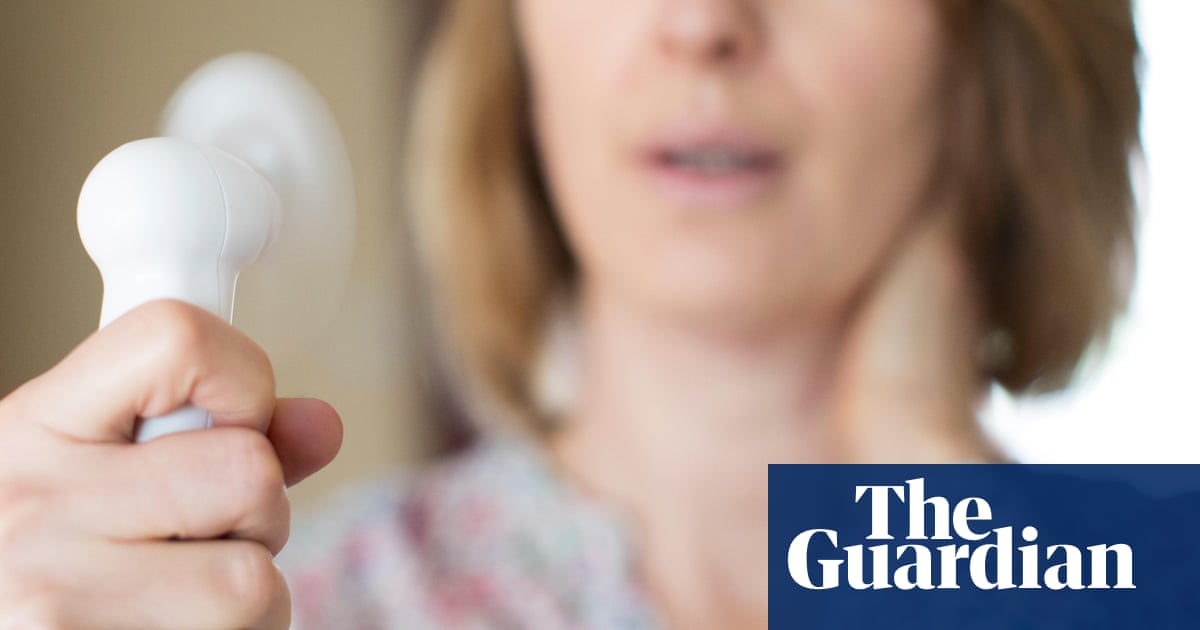
A “gamechanging” drug that prevents hot flushes and could benefit hundreds of thousands of women has been approved for use in the UK.
The green light for Veoza, also known as fezolinetant, comes after the US regulator, the Food and Drug Administration, authorised it for use in America in May.
Hot flushes, also called vasomotor symptoms, affect about 70% of women going through the menopause. Women can suddenly and overwhelmingly feel hot, which often has an impact on their quality of life, exercise, sleep and productivity.
Despite the enormous numbers of women affected, for decades there have been few safe and effective treatment options. Hormone replacement therapy (HRT) is the most effective, but this is unsuitable for many, such as some women with a history of breast or ovarian cancer, blood clots or with untreated high blood pressure. Some women experience side-effects or would prefer a non-hormonal alternative.
Speaking to the Guardian on Sunday, Julian Beach, the interim executive director of healthcare quality and access at the Medicines and Healthcare Products Regulatory Agency (MHRA), said: “Hot flushes and night sweats caused by menopause are common, and can have a significant impact on a woman’s daily life. We are therefore pleased to have authorised Veoza (fezolinetant) for hot flushes and night sweats caused by menopause via our reliance procedure.
“No medicine would be approved unless it met our expected standards of safety, quality and effectiveness, and we continue to keep the safety of all medicines under close review.”
Veoza has been approved for use in women experiencing hot flushes associated with the menopause with immediate effect. However, it has not been studied for safety and efficacy in women over the age of 65, the MHRA said, so no dose recommendation can yet be made for this age group.
The drug is a prescription-only medicine and will initially be available privately from 5 January, according to officials at Astellas, which makes the drug. The company has begun the process of applying to the National Institute for Health and Care Excellence to enable women to access the treatment on the NHS.
The price of Veoza has not yet been approved by the Department of Health and Social Care, Astellas said in response to questions about the cost of the treatment. In the US, the cost was set at $550 (£430) for a 30-day supply.
Veoza is a non-hormonal menopause drug that acts directly on the brain to prevent hot flushes. It works by blocking a brain protein called neurokinin-3 that plays a unique role in regulating body temperature in menopausal women.
Marci English, the head of biopharma development at Astellas, said: “Fezolinetant’s novel mechanism of action targets the root cause of moderate to severe VMS [vasomotor symptoms] associated with menopause. We are proud to have developed an innovative treatment option for a condition that has lacked scientific advancement for too long.”
Speaking earlier this year after its approval in the US, experts said the treatment could be transformative for hundreds of thousands of women in the UK for whom HRT is not suitable.
“This is going to be a completely blockbuster drug,” said Prof Waljit Dhillo, an endocrinologist at Imperial College London who led a pioneering trial in 2017 that paved the way for the drug’s development. “It’s like a switch. Within a day or two the flushes go away. It’s unbelievable how well these drugs work. It’s going to be completely gamechanging for a lot of women.”
A large clinical trial of fezolinetant published in March showed that after 12 weeks of use it reduced the frequency of hot flushes by about 60% in women with moderate or severe symptoms, compared with a 45% reduction in those who received a placebo. Women also said the drug reduced the severity of hot flushes and improved the quality of their sleep.
Veoza acts directly on the temperature control pathway and does not replace oestrogen, which falls steeply in the menopause. The treatment will not address the wider range of symptoms some women experience, including fatigue, muscle weakness and mood swings.
Diane Danzebrink, a menopause campaigner, said: “Hot flushes and night sweats are common menopause symptoms which can be debilitating, affecting personal health and wellbeing, family lives and careers. It’s welcome news that doctors will have an alternative option to consider during a consultation, according to individual suitability. The decision is particularly important for those who’ve felt overlooked in the past in terms of treatment options, or those who prefer not to use HRT.”












